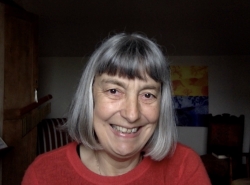- My Cart
0
No items in cart
- My Cart
0
No items in cart
 PCCS pays your UK postage
PCCS pays your UK postage
'Trauma-informed' has become a buzzword in the counselling and psychotherapy arena and the wider worlds of health and social care research and practice. But what does it mean in relation to practitioners' day-to-day work with clients? Susan Dale argues that all therapeutic work should put the client's needs, not the therapeutic model, at the heart of the process. Here she describes how she shapes her own collaborative narrative approach to work with people who have experienced trauma, whether from childhood abuse and neglect, violence, combat or other circumstances. Drawing on the literature and the first-hand accounts of trauma-experienced co-researchers, Dale weaves a narrative that demonstrates trauma-informed practice and its impact in the real-life therapy room. She includes approaches that are not formally badged as 'trauma therapies' as well as recognised models such as EMDR to demonstrate how such an approach, applied collaboratively and with acute sensitivity to the needs of the individual client, can make a lasting difference to people striving to rebuild lives that have been shattered by trauma.
Prologue
Introduction
Chapter 1 – What is trauma and how does it affect us?
Chapter 2 – Working collaboratively with trauma
Chapter 3 – Trauma and its impacts on the body and central nervous system
Chapter 4 – Cognitive behavioural therapy and psychoeducation
Chapter 5 – Internal family systems
Chapter 6 – Narrative therapy: The Tree of Life
Chapter 7 – Metaphor and creative therapies
Chapter 8 – Telling stories of trauma and re-authoring conversations
Chapter 9 – Eye movement desensitisation and reprocessing
Chapter 10 – Definitional ceremony and collective biography
Chapter 11 – Other psychotherapeutic models: Practitioner perspectives
Chapter 12 – The ethics and practice of co-research
References
There are some good books on trauma, but this is truly a great book on trauma that in the opening pages alone grabs your attention and, thereafter, takes you into Susan Dale’s most wonderful, engaging and informative writing. It guides the way for collaboration and speaks to the power of storytelling and is absolutely a must-read.
Professor Andrew Reeves, Professor in Counselling Professions and Mental Health, University of Chester
In this beautifully crafted and deeply moving book, Susan Dale helps the reader understand the harrowing and wide-ranging impacts of lived trauma experiences through the voices of her co-researchers. Ultimately, their stories of courage and resilience are a celebration of how people can recover from trauma and the diversity of therapeutic methods that can facilitate this. Highlighting that one size does not fit all, this is an essential read for all counsellors and psychotherapists.
Dr Mhairi Thurston, senior lecturer in counselling, Abertay University
The idea for this book waited patiently for someone whose personal and professional knowledge, training, worldviews, and values could possibly realise it. Susan Dale came along. Her deeply relational and collaborative spirit, compassion, humility, passion and ethical mindedness radiate throughout. A window opens onto almost 30 years of counselling experience as, using ‘trauma-informed’ methodologies, Dale empowers her co-researchers to tell their trauma stories. Research-informed and evidence-based, this recommended book will help you develop a framework for working with trauma.
Karen Stainsby, counsellor, supervisor and author
If you’re searching for a manual on how to ‘treat’ PTSD, or a review of ‘gold standard’ research on the subject, you’ll need to look elsewhere, but you’ll miss out on a superbly inspiring narrative inquiry into the subject. Susan Dale and her co-researchers provide the broadest introduction to post-traumatic stress and therapeutic ways of being with trauma-experienced clients. Both academically sound and experience-near, this should become the ‘go-to’ (rather than ‘how-to’) primer for counsellors and therapists seeking an introduction to working with trauma – whether single event, complex or indeed ‘complicated’.
Dr Mike Gallant, NHS therapist and clinical supervisor
Written very accessibly, this in-depth narrative collaboration brings to life the vibrant connection between therapist and client, using an array of psychotherapeutic models to work with trauma. Susan Dale and her co-researchers offer a rare insight for anyone interested in working with trauma, from trainees to experienced counsellors looking for CPD, with stimulating questions for reflection throughout.
Tracey Cleary, counselling officer, UHI Inverness
As I read this book I found it just the most fascinating reflection on trauma, its causes, legacy and interconnectivity with therapy. The most powerful element for me was the inclusion of the experiences of people who have suffered trauma, the isolation and loneliness it led to, the positivity of counselling and how it had helped them regain a life. This book is definitely one for everybody in the counselling professions to read.
Steve Rattray, counsellor, psychotherapist and clinical supervisor
Susan Dale lives and works in the Scottish Highlands. Following her training as a counsellor in the early 1990s, she undertook an MSc in counselling and then went on to study narrative therapy and life story research, culminating in a Doctorate in Education at Bristol University in 2009. Since then, alongside her therapeutic practice, she has undertaken many collaborative research and writing projects and published widely through journal articles and several books. These include Where Angels fear to Tread: An exploration of having conversations about suicide in a counselling context (2010); Songs at Twilight: A narrative exploration of living with a visual impairment and the effect this has on claims to identity (2011); The Secret Keepers: Narratives exploring the inter and transgenerational effects of childhood sexual abuse and violence (2013), and Threads of Hope: Counselling and emotional support services for communities in crisis (2016).
